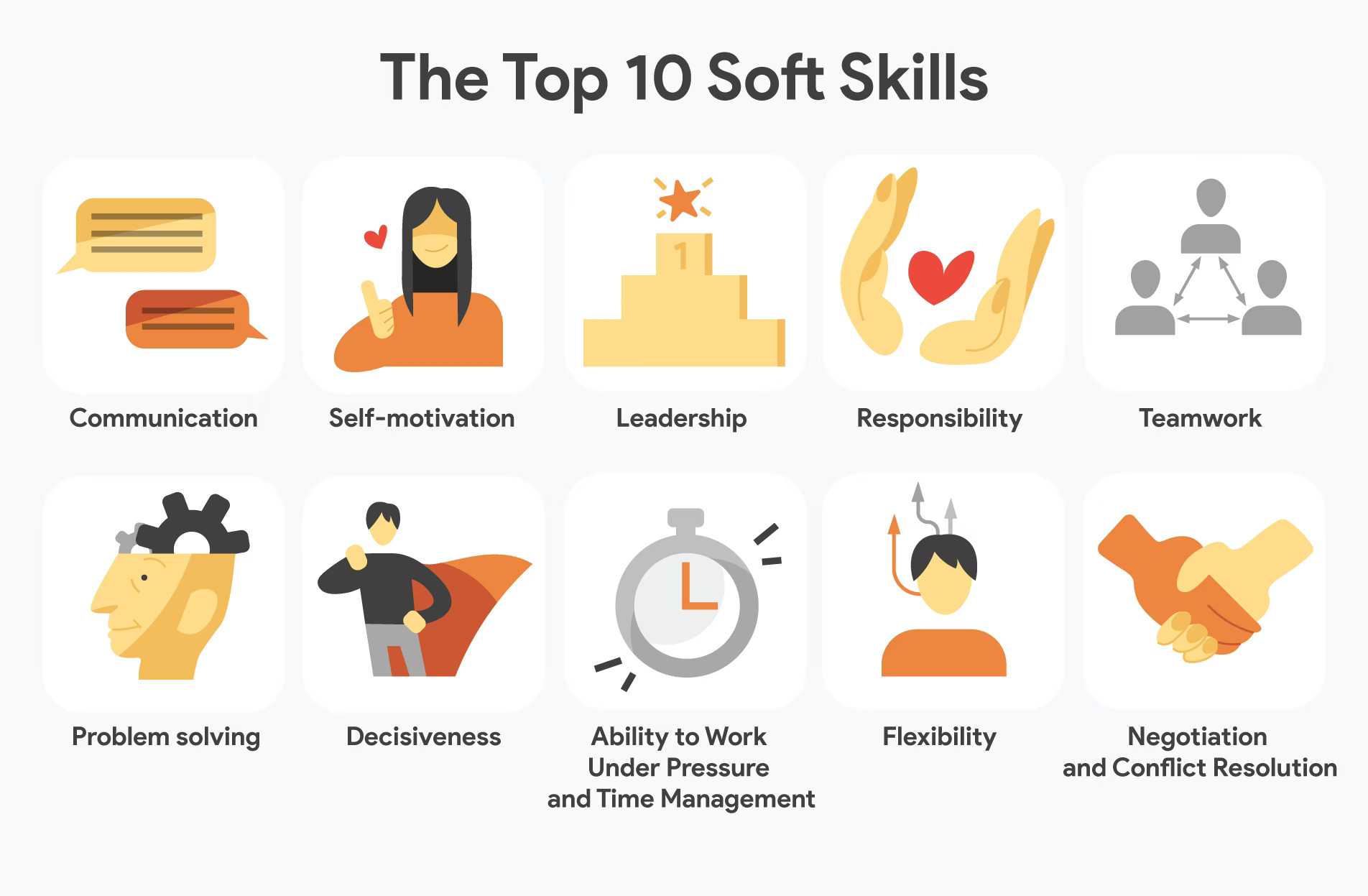Top 5 Soft Skills that Everyone Should Master in their life
Skills are someone’s abilities, talents or expertise to do a certain task in any field of life .Skills may be hard or soft and all these skills help to succeed and foster in life and perform better than others and achieve your goals in a more decent or professional way .skills are needed in all aspects of life whether it’s job, school, business, workplace ,sports or even hobby.
Soft Skills (also called core skills) are interpretational attributes that you need to succeed in workplace and are desirable in all professions.They could be also defined as ability to interact amicably with others.Soft skills are related to how you work at job,in a team or in any another task.

Soft skills include:Interpersonal,communication and listening skills; time management etc .Someone can be laced with technical or job specific skills, but if he/she can’t manage his/her time or work within a team, they may not be successful in the workplace.Some of the exclusive soft skills are :
- Communication
- Problem solving
- Interpersonal skills
- Self awareness
- Work ethic
- Time management
- Organization
- Leadership
- Adaptability
- Team work
- Collaboration
- Decision making
- Empathy
- Creativity
- Emotional intelligence
- Active listening
- Critical thinking
- Conflict resolution
- Flexibility
- Negotiation
- Writing
- Dependability
- Public speaking
- Motivation
- Persuasion
- Stress management
Public speaking:
It refer to the talent of effectively addressing an audience. It could be in front of a group of people you already know or a crowd of complete strangers, your ability to communicate to them with clarity and confidence and actively delivering your message or thought is known as your public speaking Skills.

Public speaking is an essential skill that every organization or company looks for in their employees. Art of Public speaking is a sign of progress and success in future as it helps in keeping good relationships with your company,organization and team and there are more opportunities to Excel in your field.
The primary types of public speaking include:
- Ceremonial speaking
- Demonstrative Speaking
- Informative Speaking
- Persuasive Speaking
These public communications happen through public speaking events, conferences, seminars, press conferences,Newspaper editorials and billboard advertisements, social media posts and blogs etc. Electronic and print media (newspapers, magazines, radio, TV) are a powerful tool of public communication or speaking.
Tips to improve public speaking:
Some of the tips to master this skill are;
- Being Nervous Is Normal. Keep yourself calm.
- Know Your Audience and the type of audience
- Organize Your Material in the Most Effective Manner to Attain Your Purpose .Be organized in your thoughts and ideas .
- Watch for Feedback of your audience.Welcome the criticism and opinions of audience with warm heart and Adapt to It.
- Let Your Personality Come Through
- Use Humor
- Enhance your vocabulary and knowledge.
- Tell Stories and Use Effective Language.
- Don’t Read Unless You Have to.
Stay up to date with the world and current affairs.
Benefits of public speaking skill
Public speaking skill has exclusive personal advantages, such as confidence building, boosting self esteem and enhancing critical thinking skills .It expands your social network and helps in personal development.It also gives sense of satisfaction.It gives you opportunities to foster in life and achieve your goals with dignity .
Emotional Intelligence:
It is the ability to control,use, show,identify, understand and manage One’s emotions and handle them in a positive way to relieve stress and communicate in a better way, empathize with others and overcome challenges effectively.

According to Daniel Goleman , an American psychologist who helped to popularize emotional intelligence, there are five key elements to it:
- Self awareness.
- Self regulation.
- Motivation.
- Empathy.
- Social skills

Many people believe that this self awareness is the most important part of emotional intelligence. Self Regulation – This is the ability to control emotions and impulses. People who self regulate typically don’t allow themselves to become too angry or jealous, and they don’t make impulsive, careless decisions.Empathy allows you to understand other’s emotions and act accordingly in a positive manner and defuse conflicts.
Ways to boost your emotional intelligence:
- Observe how you react to people
- Look at your work environment.
- Do a self evaluation.
- Examine how you react to stressful situations.
- Take responsibility for your actions.
- Examine how your actions will affect others – before you take those actions
- Utilize an assertive style of communicating.
- Respond instead of reacting to conflict.
- Utilize active listening skills.
- Be motivated.
- Practice ways to maintain a positive attitude.
- Practice self awareness.
- Take critique well.
- Empathize with others
- Become aware of and tune into your own emotions.Seek to understand the points of view of others.
- Develop connections with people.
- Practice emotional management.
Emotional intelligence is important at work,in personal relationships,in team and businesses so you can perceive, reason with, understand and manage the emotions of yourself and others. Being able to handle emotions gives you the ability to guide and help people, and it can help you be happier and more successful.
Time Management:
Time management is the process of planning and exercising conscious control of time spent on specific activities, especially to increase effectiveness, efficiency, and productivity. (Definition by Wikipedia)

Time management is an art and perfection in this skill can make you be organized and relaxed.Prioritising important tasks helps you focus and reduces distraction and overwhelm. When you prioritize, you allocate your time and energy to your most important work, which increases efficiency and effectiveness. Prioritising important work helps you achieve better results in less time.
Here are a few prioritizing methods used to manage your time and you can apply to get more done and feel more productive using the three P’s of time management:
- Planning
- Prioritizing
- and Performing.
Another prioritizing method is “D’s” method.There are 4Ds to manage your tasks:
- Do
- Defer (Delay)
- Delegate
- Delete (Drop
Performing your tasks using these categories helps you utilize your limited time more effectively and stay focused on what matters most to you.
Another common method for prioritizing tasks is the ABC method, which categorize each task with the letter A, B, or C. The most important tasks on your time management plan are given the letter A, less important tasks the letter B, and the least important tasks the letter C.
Tips to improve time management skill:
- Be conscious and keep a to-do list
- Having a to-do list may not seem a powerful technique, but it’s one of the most powerful ways to become more productive
- Be prioritized and categorize your tasks.
- Stay focused and manage distractions.
- Be organized and time block your work.
- Be self aware and keep tracking your time
- Determine what’s most important in your life. What gives you energy and drive each day?
- Keep a file of your motivating factors from above.
- Control the inputs and outputs into your life.
- Schedule your day and routine.
- Have a strategy meeting with yourself each week
- Design a list that contains all tasks in one.
- Identify what’s important: Understanding your true goals
- Highlight what’s urgent.
- Avoid competing priorities.
- Consider effort.
- Review constantly and be realistic

With time management skill,you can be more productive and get more done in less time in effective and decent way .
Critical thinking skills:
Critical thinking is the analysis of facts to form a judgment.It is also an emerging skill that companies and organizations look for in a person. Core critical thinking skills examples are:
- analytical thinking
- interpretation
- inference
- evaluation
- explanation
- self reflection
- Good communication
- Creative thinking
- Open mindedness
- Ability to solve problem
- Asking thoughtful questions
- Promoting a team work approach to problem solving

These skills are essential to problem solving and decision making in an extremely wide variety of contexts and at all educational and professional levels.
Steps of Critical Thinking
- Identify the problem or question.
- Gather data, opinions,views and arguments
- Analyze and evaluate the data.
- Identify assumptions.
- Establish significance.
- Make a decision/reach a conclusion.
- Present or communicate.

Critical thinking will enable you to express your thoughts, ideas, and beliefs beautifully. Better communication helps others to understand you better, resulting in less frustration for both of you. Critical thinking boosts creativity and makes you think out of the box and this skill could be applied in any area of life .
Team work:
Team work is the ability to work in a team or as a team and it is also an exclusive and essential skills that is needed at every workplace.This also includes some other interpersonal skills ; active listening, communication, flexibility and responsibility.When you are working as a team ,you must have ability to solve problems, communicate with each other,bring ideas together and get your work done nicely.

Strong interpersonal skills and team work enables leaders to foster meaningful relationships with their team, motivate employees, address the poor performance or root cause, engage the team and navigate setbacks.

Tips for improving interpersonal skills:
Here are some ways to enhance your interpersonal skills in the workplace:
- Cultivate a positive outlook and broaden your mind.
- Control your emotions and act in a decent way .
- Acknowledge others’ expertise.
- Show a real interest in your colleagues.
- Find one good trait in every co-worker.
- Practice active listening.
- Be assertive.
- Practice empathy.
- Appreciate every little good act or effort of your co worker .

Interpersonal communication skills can help you be productive in the workplace, build strong and positive relationships with your colleagues and complete team projects smoothly and effectively. The benefits of good interpersonal skills can affect the morale and productivity of your entire team or department.
To sum up, Soft skills are qualities that enable you to engage in meaningful communications with others. Since most jobs require teamwork, it’s important to possess soft skills to foster your employability and achieve your dream job.Soft skills are crucial for students.Through soft skills training programs, students will be able to handle interpersonal relationships with a strong sense of empathy. They will also be in a good position to monitor the emotions of others so as to come up with well-informed perceptions about others’ behavior and thinking patterns.





